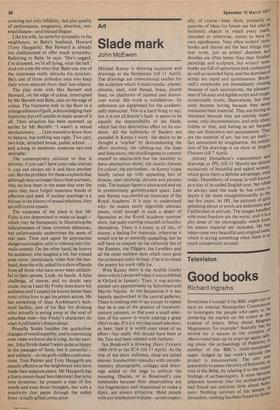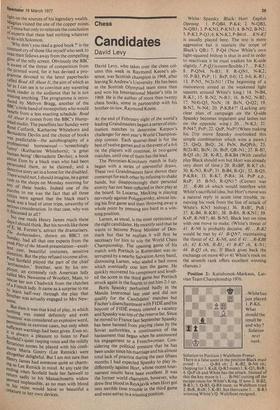Television
Good books
Richard Ingrarns Sometimes I wonder if the BBC ought not to have an internal Monopolies Commission to investigate the people who seem to be cornering the market on the screen at the expense of others. What about Magnus Magnusson, for example ? Scarcely has he retired for a season as the compere of Mastermind than up he pops up again talk. ing about the archaeology of Palestine In another of the BBC's multi-instalment sagas. Judged by last week's episode the project is misconceived. The aim was apparently to assess the story of Solomon, as told in the Bible, by relating it to the recent findings of archaeologists. It soon beca.me apparent however that the archaeologists had found out precious little about Solomon. Nothing survives of his temple In Jerusalem, nothing has been found to throw light on the sources of his legendary wealth. Magnus visited the site of the copper mines • at Timna but only to reiterate the conclusion of experts that these had nothing whatever to do with Solomon.
'Why don't you read a good book ?' is the constant cry of those like myself who seek to coax their fellows away from the compelling glow of the telly screen. Obviously the BBC is aware of the threat of competition from the printed word, for it has devised a programme devoted to the latest paperbacks Called Read All About It, the aim of which as far as I can see is to convince any wavering book reader in the audience that he is not Missing anything. The programme is introduced by Melvyn Bragg, another of the RBC's little band of monopolists who would benefit from a less exacting schedule. Read 411 About It comes from the BBC's Hampstead studio. The panellists last Sunday were Reri Cutforth, Katharine Whitehorn and Bernadette Devlin and the choice of books was predictable—the autobiography of a Professional homosexual — `screechingly funny' (Katharine Whitehorn); 'a great human being' (Bernadette Devlin); a book about Eton by a black man who had been Persecuted there, so he claimed; and a detective story set in a home for the disabled. There would not, I should imagine, be a great rush to the shops on Monday morning for any of these books. Indeed one of the Puzzles to me was the fact that all three critics. were agreed that the black man's book was a load of utter tripe, unworthy of Serious consideration. In that case, why was it discussed at all ? No one reads Henry James much these 'Lays I should think. But his novels like those of E. E. M. Forster's, attract the dramatisers. Sunday ne Ambassadors, shown on BBC1 on Linday, had all that one expects from the Posh Play of the Month presentation—excelent cast, beautiful costumes, sensitive direction. But the play refused to come alive. ,Paul Scofield played the part of the chief ambassador,' Strether, sent by his emP1°Yer, an extremely rich American lady Called Mrs Newsome of Woollett, Mass, to r escue her son Chadwick from the clutches ,,, a French lady. It came as a surprise to me to learn half-way through the play that 4t rether was actually engaged to Mrs Newsome.
But then it was that kind of play, in which !loth
-Ing was stated definitely and even Mistress was considered an explosive word, Permissible in extreme cases, but only when s iturfi. clent warnings had been given. Even so, e. Is always a pleasure to listen to Paul quiet rasping voice and the mildly ttittrtatious scenes he played with his confi2nte Maria Gostry (Lee Remick) were q,,dogether delightful. But I am not sure that n enrY James had someone quite so charming as Lee Remick in mind. At any rate the ending when Scofield bade her farewell to return sadly to his Massachusetts widow eemsed implausible, as no man with blood i n Ills veins would leave so beautiful a creature to her own devices.



































 Previous page
Previous page